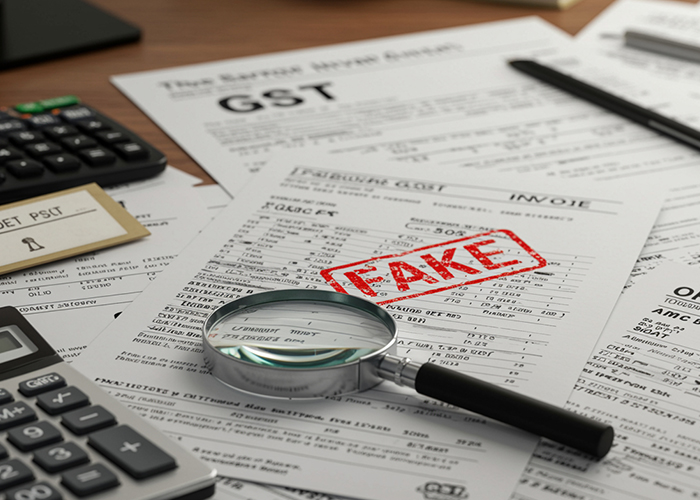Understanding Fake Invoicing under GST: Legal Implications, Case Laws & Compliance Risks
Introduction
With the introduction of the Goods and Services Tax (GST) regime in 2017, India witnessed one of the most significant tax reforms in its history. GST aimed to unify the indirect tax structure, increase transparency, and reduce cascading tax effects. However, as with any system, loopholes emerged, and fake invoicing quickly became one of the biggest threats to the integrity of the GST framework.
Fake invoicing not only causes substantial revenue loss to the government but also distorts fair competition among businesses. This blog aims to give a comprehensive overview of fake invoicing, how it is treated under the GST law, penalties involved, notable case laws, and how businesses can safeguard themselves from unwittingly falling into legal trouble.
What is Fake Invoicing?
Fake invoicing refers to the practice of issuing or utilizing GST invoices without actual supply of goods or services. The objective is typically to fraudulently claim Input Tax Credit (ITC), evade tax, inflate turnover, or launder money.
Common Forms of Fake Invoicing:
- Issuing invoices without supply of goods/services
- Claiming ITC based on such invoices
- Using fake GSTINs or non-existent entities
- Circular trading – rotating invoices between entities to artificially inflate turnover
Bogus billing chains created to generate ITC without actual business activity

Legal Provisions under the CGST Act, 2017
Key Sections Dealing with Fake Invoicing:
Section 122 – Penalty for certain offences
- Prescribes a penalty for any person who issues or receives fake invoices.
- Penalty may extend to ₹10,000 or the amount of tax involved, whichever is higher.
Section 132 – Punishment for certain offences (Criminal Offences)
- Covers serious offences such as issuance of fake invoices without supply.
- If the tax amount involved exceeds ₹5 crores, punishment may extend to five years of imprisonment.
Subsections used in Fake Invoicing Cases:
- 132(1)(b): Availing ITC using fake invoices
- 132(1)(c): Obtaining refund fraudulently based on fake documents
- 132(1)(d): Issuing invoices without actual supply
- 132(2): Offences are non-bailable if tax involved exceeds ₹5 crores
- 132(5): Provisions applicable even if tax has not been determined
Section 67 & 69 – Search, Seizure, and Arrest
- Allows authorized officers to search premises and seize documents
- Permits arrest if credible evidence suggests a cognizable offence
Why Do People Use Fake Invoices?
Despite stringent laws, fake invoicing continues due to:
- Desire to inflate ITC to reduce net tax liability
- Money laundering under the garb of business transactions
- Boosting turnover to obtain loans or tenders
- Creating paper trails for unaccounted cash
- Misusing refund mechanisms, especially in export cases
Our Success Story: Bail Granted in Fake Invoicing Case
In a recent case, Our Client was arrested by the Directorate General of GST Intelligence (DGGI), Pune, for alleged involvement in a fake invoicing racket under Sections 132(1)(b), 132(1)(c), 132(1)(d), 132(2), and 132(5) of the CGST Act.
- His first bail application was rejected.
- On filing a second application, Adv. Sachin P. Kumar argued that the investigation was complete and electronic evidence couldn’t be tampered with.
- Reliance was placed on Supreme Court Judgements.
- The court granted bail on execution of a PR bond of ₹1,00,000 with solvent sureties.
This case reaffirms the legal principle: “Bail is the rule, jail is the exception.”
Consequences of Fake Invoicing
1. Heavy Penalties
Under Section 122 and related provisions, penalties may extend to the full amount of tax involved or more.
2. Imprisonment
- Upto 5 years imprisonment for offences involving tax amounts > ₹5 crores.
- Cognizable and non-bailable offences.
3. Attachment of Property
- Under Section 83, the Commissioner can provisionally attach property including bank accounts during the pendency of proceedings.
4. Business Disruption
- GST registration may be cancelled.
- Business reputation is severely damaged.
Judicial Precedents on Fake Invoicing
State of Rajasthan vs. Doodh Nath Singh (2020)
Held that bail must be granted if investigation is complete and there is no risk of tampering with evidence.
Ashutosh Garg vs. Union of India (2021)
Supreme Court observed that electronic evidence, being preserved digitally, cannot be easily tampered with favoring the granting of bail in GST fraud cases.
Jayachandran Alloys Pvt. Ltd. vs. Commissioner of GST (2019)
Madras High Court emphasized that arrest should not be used as a tool of harassment, and should be based on necessity and evidence.
How Can Businesses Protect Themselves?
Fake invoicing schemes often involve multiple parties. Even genuine businesses may fall into legal trouble if they deal with fraudulent vendors. Here’s how you can avoid it:
Know Your Supplier
- Check the GSTIN validity and registration details on the GST portal
- Avoid dealing with fly-by-night operators or shell companies
Match GSTR-2A with ITC Claims
- Regularly reconcile purchase data with GSTR-2A/2B
- Avoid claiming ITC for invoices not uploaded by suppliers
Avoid Cash Deals
- Maintain clean payment records through banking channels
Conduct Internal Audits
- Periodically audit your input credit chain and vendor compliance
- Engage qualified professionals for tax audits
Educate Your Staff
- Train your accounts and finance teams on GST compliance
- Keep updated with changing GST norms

Role of Technology in Detecting Fake Invoicing
The government has ramped up technological surveillance through:
- E-invoicing: Makes it difficult to issue fake invoices without a proper trail.
- AI & Data Analytics: GSTN uses AI to detect mismatches and unusual transactions.
- PAN–Aadhaar–GST Linking: Strengthens the KYC layer to reduce dummy registrations.
These measures have already led to detection of thousands of fake GSTINs and fraudulent ITC claims worth crores.
Conclusion
Fake invoicing under GST is not a minor procedural lapse, it is a serious criminal offence with far-reaching consequences including arrest, imprisonment, financial penalties, and reputational damage. However, with proper legal representation and documentation, individuals and businesses can defend themselves if wrongly accused.
At the same time, vigilance, compliance, and regular audits are key to preventing unintentional involvement in such frauds. The government, on its part, is actively monitoring suspicious transactions and using data intelligence to crack down on GST fraud.
Businesses must treat GST compliance not as a burden but as a strategic shield protecting them from legal scrutiny, preserving their credibility, and fostering long-term growth.
Need help or information regarding GST Matter
Our team specializes in GST litigation, bail applications under GST offences, and compliance audits. . For any information drop us a mail on spkumarassociates@gmail.com or reach our website www.sachinpkumar.com

